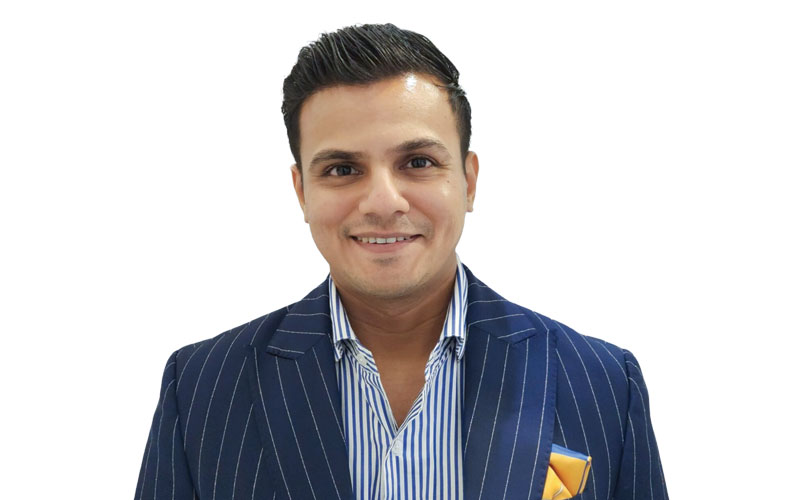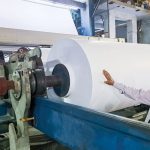At the helm of Jani Sales Private Limited is Mr. Abiali Jani, a dynamic and visionary leader, who has been steering the parent company with exceptional business acumen and innovative marketing techniques since 2012. For him, the success of his business is defined by financial achievements, environmental impacts and social responsibilities. With astute leadership and marketing prowess, over the years he has taken the company to another level, catalyzing remarkable growth. In an exclusive interview with Paper Mart, the Director talks about his journey as an entrepreneur and how he navigates through the ever-evolving landscape of the industry to build a successful business.

Paper Mart: Please share your path to entrepreneurship. Who inspired you along the way?
Abiali Jani: I started my business journey in 2012 after finishing my graduation from Narsee Monjee College of Commerce and Economics. It’s been 12 years since I started independently handling my family business. Jani Sales Private Limited is a 45-year-old company. It’s known for trading packaging boards and duplex board mills in India. We export paper boards to the Middle East and European countries and also supply secondary fiber to Indian mills and the far East.
My biggest and constant inspiration has been my father. He started from scratch and built the entire Jani Sales empire by himself. The biggest belief I have inherited is: Nothing is Impossible. We’ve seen him apply this in business as well as in every aspect of life. The way he operates or sees things isn’t influenced by market fluctuation; he always believes in achieving growth in any market condition.
PM: What obstacles did you encounter as a young businessman, and how did you navigate?
AJ: I was hardly 25 when I joined the family business. My father had already established strong relationships over the years with suppliers across the country. They were very comfortable working with him. The biggest challenge for me was to get acceptance as a young person taking charge of the business. However, the customers, who had worked with my father, gave me the opportunity to prove myself, and I proved myself. Gradually, I won their trust. Today, we are blessed with customers who have been us for the past 25-30 years.
Watch: In Pursuit of Lesser Water Footprint
PM: What significant change did you introduce, and when did you realize it was needed? What skills proved crucial in your early entrepreneurial venture?
AJ: One major change that took place after my entry in the family business was our expansion into the paper manufacturing market in 2020. We were already into paper trading at both local and international levels, apart from supplying waste paper to Indian mills. So the only thing left to complete the paper circle was the manufacturing segment. Our team, which includes my father, me and my two brothers, recognized this as a niche area which we had not explored, and also as one area which was going to be the next big thing in future. We had initially decided to start our manufacturing plant in March 2020, but the Covid-19 pandemic and the subsequent lockdown delayed our plans, and we finally launched our entire production in September 2020.
We had imported machinery to manufacture all white grades including tissue and poster papers for the food grade industry. However, during the lockdown, all events were cancelled. We did not know what to do with the new machine. Then we used our skills and decided to manufacture kraft paper. It became a successful venture because e-commerce was booming at that time. We were able to replace imports with local manufacturing, which no one had done then.
PM: How has the business chart of Jani Sales changed in the last 12 years?
AJ: We’ve doubled our exports and registered significant growth, in terms of percentage. Apart from our existing clients, who have been associated with us for the past three decades, we have added new customers in all three verticals. We are trading around 60,000MT annually in the local market and 1,40,000MT in the international market. In waste paper, we are doing around 6,00,000MT. These are the trade numbers, and on top of it we manufacture and sell close to 30,000MT from our manufacturing unit.
Apart from being a businessman, Mr. Jani is a passionate footballer, a connoisseur of watches, and a self-proclaimed petrolhead with a love for high-performance vehicles. He envisions a future where business growth goes in tandem with environmental responsibility and actively implementing eco-friendly strategies. To him, business isn’t solely about profits, but about rewriting the rules of successful entrepreneurship, where sustainable practices intersect with personal passions.
PM: How do you maintain your drive and focus on your objectives in the ever-evolving pulp and paper industry?
AJ: Our vision has been very clear since the beginning. We are very passionate about paper. There have been developments around other materials, such as plastic or metal, but we’ve maintained our single-point focus on one particular grade, paper. We have created all our three verticals around paper. This can be counted as one of the reasons for our growth as well. When we realized that we had reached a saturation point in the local market, we started exporting outside the country. After achieving significant volumes in exports, we started supplying waste paper to Indian mills. Then we decided to enter the manufacturing market. We have an edge over our competition, that we have our own sources of raw material and also we are present in the export market by ourselves. This resulted in less dependency on others and higher sales.
PM: How do you respond to feedback and critique regarding your business concepts or methods?
AJ: I take criticism very positively and do not read any feedback as a critic. I look at it as an opportunity for improvement. My biggest critic is my father. He wants me to grow further in the existing business. He always says that markets are never bad, you need to change your thought process.
PM: How does networking play an important role in your journey as an entrepreneur?
AJ: It has played a major role in our success story. We got a lot of exposure, and the volume of sales also went up considerably. We have been in the business for around 45 years and boast of a good presence in both local and global markets. Jani Sales has become a brand in itself, which is an outcome of networking.
Also Read: CPM’s New Tissue Paper Machine & IPM’s Cut-Size Paper Brands in Saudi
PM: How has your workforce contributed to your business?
AJ: Our workforce is very strong. We have people working with us for the past 25-30 years. This was their first job and they are happy to remain with us. They consider Jani Sales as their own company. We’ve empowered them to make strategic decisions on their own. This makes us free to always target new markets and products.
There was a particular time before we entered the manufacturing market when I would attend office only twice a week. The rest of the time I was in the field. It became possible only because of my team, which provided very strong backend support. It was only because of their strong support that I was confident to remain away from the office for long hours and attend to the constant needs of the customers.
PM: What tips would you offer to young individuals thinking about launching their own ventures?
AJ: First and foremost, I would like to say that they should begin with their existing platform. A lot of youngsters nowadays are not taking an interest in their family business because of several reasons. Since they already have an established platform, they should work around it, evolving ways to make it more commercially viable. It will give them strategic insights into how to run an entrepreneurial venture successfully while looking for better growth opportunities. It’s equally important to maintain good relations with your staff. Treat them as your family because they are the backbone of any flourishing business.
PM: What are your future expectations over the next five years?
AJ: We are very bullish on the whole manufacturing part. We are studying a lot of projects and would definitely like to add more manufacturing units in the coming years. Currently, we are setting up a new tissue machine (PM2), which will start operations in November 2024. With a production capacity of around 21,000 tons annually, the new machine will produce soft tissue from virgin pulp in the range of 11.5 GSM to 50 GSM.



